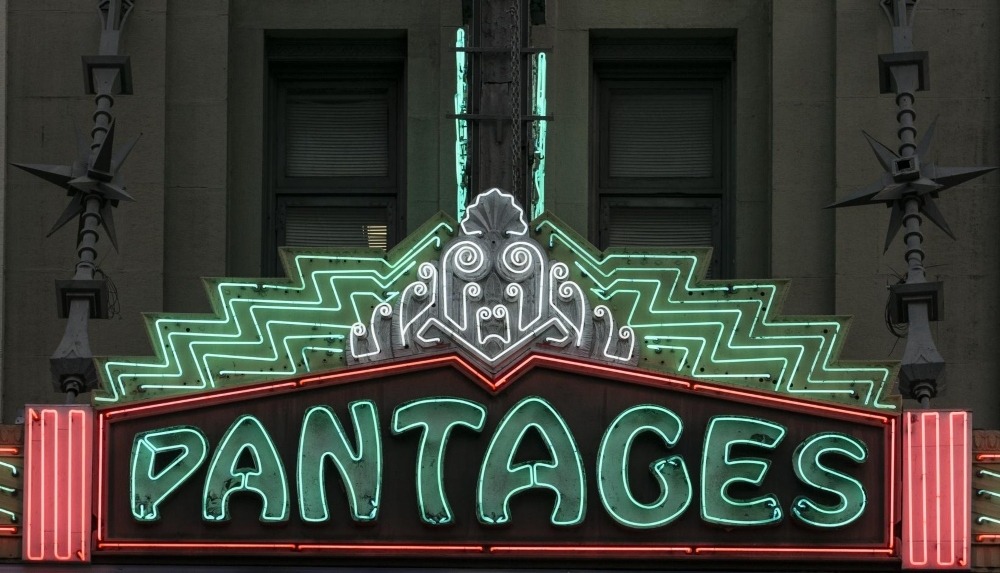If it was true that Alexander Pantages’ father was a Greek cognac maker, then it may also be true that his uncle was a Cairo tobacconist.

But Alexander wanted something different, and so he followed the sea. He caught tramp steamers and worked as a cabin boy. Later, he sold newspapers, waited tables, tried day labor and bootblack duties, and eventually found his calling in the new role of entertainment impresario.
In the early 1880s, he worked for the French company digging the Panama Canal, but after two years, the heat and malarial conditions drove him to seek new opportunities. Catching another tramp steamer, Pantages experienced a fall from the yardarm into the chill waters of Puget Sound, just off the new village of Port Townsend.
Later on, Seattle’s claim on Alexander Pantages was strong. He began his theater career on downtown Seattle streets, though he often proclaimed San Francisco as his home. At the height of his career, he would say that “California has more local talent than all the rest of the United States together.”
In 1898, gold fever hit San Francisco for the second time in 50 years. This time the true riches were in far-away Alaska, not neighboring Eldorado County. Pantages joined the stampede to the Yukon, along with writer Jack London and many others. The boat trip north was a rough one, according to Pantages, who arrived with 25 cents of his alleged $1,000 savings. Gambling vultures (among the more common type of entertainment to which Pantages was addicted) had worked overtime on the young Greek. He took the first job offer out of desperation, a waiter’s position at Harriet “Ma” Pullen’s boarding house in Skagway.
Soon, Pantages and others organized a small stock-theater company. When quarrelling divided the group, Pantages went to performer Klondike Kate and asked if she would underwrite the enterprise. She agreed, and the name Orpheum (used many times later by Pantages, after the Greek myth in which Orpheus charms the beasts, rocks, and trees with his singing) was given to their amusement hall. Its popularity grew with the unusual array of acts young Pantages found, oftentimes by raiding his competitors.
By 1906, he and his wife Lois built a modest Seattle dwelling at Harvard Avenue and East Denny. A few years later, he built his grand mansion at 1117 36th Avenue East, on the corner of Madison Street, across from today’s Broadmoor district. His “palace” was designed by Wilson & Loveless in what had been called a mix of gothic, Tudor, colonial, and California mission styles.
Just before the beginning of World War I, Pantages emerged as the top theater owner in the United States. Competitor Sullivan-Considine began to come apart when Timothy Sullivan was declared insane, and heavy travel and mortgages became a burden to John Considine. Despite his efforts to sell, Considine watched his empire fall, with Pantages buying many of his theaters. The war and flu epidemic of 1919 kept people away from theaters, but Pantages hung on. By 1926, he held 30 theaters and entertainment houses and controlled 42 others. He was then, many believed, the foremost figure in the entertainment field.
After the Great War, due to heavy business commitments in California and a more appealing climate, Pantages moved to Los Angeles.
One of Pantages’ master strokes occurred in 1911 with the hiring of B. Marcus Priteca, the Seattle architect who became famous for his theater designs such as Seattle’s old Orpheus. Seattle’s Coliseum, and Tacoma’s still-standing Pantages, are other examples of Priteca’s eclectic genius.
Pantages and Priteca were virtual partners for years. Priteca’s ornate, rococo work, as well as his design of superb acoustics, became awesome examples of an entertainment era that eventually declined with the rise of vaudeville headliners. In 1925, he entered the motion picture world. Although he had always disliked “movies,” he knew that they were here to stay, and he had an obligation to give his customers what they wanted.
On February 18, 1936, Alexander Pantages, the Greek lad who in his beloved America was to influence the field of entertainment for generations, died of a heart attack in Los Angeles. Because no one knew his year of birth, his age at death had never been verified. The Los Angeles papers, no doubt appreciating Pantages’ penchant for exaggeration, listed him as 64 years old, though he may have long since passed his 70th birthday.
Discover more from Post Alley
Subscribe to get the latest posts sent to your email.

Always glad to see Pantages recognized!